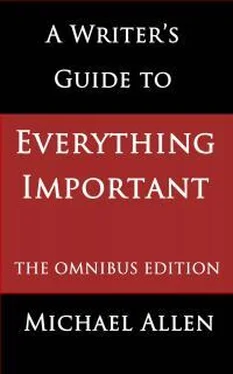14. How you can do it
This section is going to be more positive. And about time too, you may think. I’m going to show you a number of ways in which you can vary your style, within an orthodox first-person narrative, to reveal a great deal about your leading character, and thus make him or her a more sympathetic figure. Alternatively, of course, you could use this technique to reveal what an out-and-out bastard your narrator is.
Being a shameless self-publicist, I am going to use my own fiction to illustrate most of the points made in this section. To begin with, however, I want to mention a classic short story (and later novel) which constitutes the most powerfully moving example of this technique that I have ever come across.
14.1 Flowers for Algernon
Flowers for Algernon , by Daniel Keyes, was first published in the April 1959 issue of The Magazine of Fantasy and Science Fiction ; I think I read it at the time, or at any rate soon after. The short story, or novella, was later enlarged into a novel and there were subsequent film and stage adaptations.
To summarise: the story is presented in the form of a journal written in the first person by Charlie, a man with an IQ of 68. Charlie is selected to undergo experimental surgery to increase his IQ.
To begin with, Charlie’s journal naturally reveals a man who struggles with spelling and punctuation and is clearly not the sharpest knife in the drawer. Here’s a brief clip from ‘progris riport 1’:
I hope they use me becaus Miss Kinnian says maybe they can make me smart. I want to be smart. My name is Charlie Gordon and I werk in Donners bakery where Mr Donner gives me 11 dollars a week and bred or cake if I want.
The surgery succeeds, and Charlie begins to get smarter and smarter. As his intelligence increases, his writing style naturally reflects his powerful new intelligence
Eventually he becomes a man with a vast vocabulary and a clear understanding of the most difficult scientific concepts. Sadly, however, his new personality leaves him isolated and unpopular among the people previously were his friends.
In due course, the mouse (Algernon) who was first subjected to the techniques of intelligence enhancement, begins to fall ill and dies. Gradually, and painfully, Charlie realises that his own powers are fading too. His writing deteriorates in every way: spelling, punctuation, grammar. Eventually he returns to his original condition – a man capable only of the most menial work in a factory.
All of this is revealed to us by the author through the use of various writing styles – and it is, I repeat, the single most impressive piece of stylistic variation within one story that I have ever come across.
14.2 More mundane examples
I am going to do no more now that show you how any writer can achieve emotional effects by writing in a distinctive first-person style, one which is consistent with the kind of person who is telling the story.
Young and inexperienced writers are often attracted to the first person because they believe that it somehow feels more ‘natural’. This is complete bollocks, frankly, but young people, and young writers in particular, are often fuzzy thinkers. Even Norman Mailer, in the early part of his career, used to say that he could only write in the first person; and then, when he came to write a non-fiction account of his experiences during a political march on the Pentagon ( The Armies of the Night ), he used the third person. Go figure.
Personally I believe that the third person form is more flexible and useful in most cases – please see my book A Writer’s Guide to Viewpoint for a fuller discussion – but I use the first person when I think it is more appropriate. In the next few sub-sections I’m going to give a few extracts from some of my recent work to illustrate the point.
14.3 Daphne before She Died
About ten years ago I wrote a novel that included quite a lot of autobiographical elements. Note please that I say elements. I don’t say that I wrote an autobiography.
If you’re going to write an autobiography, or a book of memoirs, for goodness’ sake have the grace to label it as what it is. Don’t try to kid yourself or anyone else.
Yes, I do know that vast numbers of novels have been written which were thinly veiled versions of the author’s life story. Somerset Maugham, to take a random example which pops into my head, wrote Cakes and Ale , which included a portrait of Hugh Walpole; A Dance to the Music of Time was twelve whole volumes of fiction based on the life of the author, Anthony Powell; and so on. But it is not a procedure to be recommended, not least because of the English law of libel, which definitely does not favour the writer.
Anyway, back to the point. The novel of mine to which I refer is now entitled Daphne before She Died , and it is published under my own name (Michael Allen) in Kindle format.
The novel, set in England, is narrated in the first person by Robert Duval, a widower in his mid fifties. He is a well educated man (public school and Cambridge) and he works as a solicitor. His background is therefore similar to my own, and in writing in Robert’s character I did not have to make any major variations from my own ‘normal’ style of writing and speaking.
Here is a short extract to illustrate how a typical page or two is presented to the reader. This passage comes from the prologue at the very beginning of the book. The readability index of this passage, by the way, is 10.64 – call it 11. I am perfectly happy with that.
Daphne, before she died, made me promise to tell you this story. It is the story of how, as a respectable married woman of nearly forty, she fell in love with a young man half her age. For the best part of a year, she conducted a secret but reckless affair with him – one which put her constantly on the edge of exposure, scandal, and disgrace.
You might think that this was simply an unfortunate episode of madness, something that happened a long time ago and is best forgotten. But that is not what Daphne wanted. She wanted her story to be put down on paper, for the benefit of the young, if you please.
The nature of the story is such that I have had to include an account of a separate but parallel love affair of my own. This was a juvenile infatuation, I suppose, but it was intense enough at the time, and it was consummated just as often, and with every bit as much passion, as was hers. These two affairs were in any case dangerously interlocked, each threatening to expose the other; and if I am confessing to Daphne’s sins, I can hardly shrink from confessing mine.
No harm can come from my telling you these stories now; but if it had not been for my promise, which I gave to a woman close to death, I would never have written a word.
14.4 How and why Lisa’s Dad got to be FAMOUS
A few years later I wrote another novel in the first person. This time the narrator is a 39-year-old man who works a carpenter. In other words, he probably left school at 16 and maybe received some part-time training in the woodworking business at a local technical college. Whereas Robert Duval, in Daphne before She Died , might be assumed to have an IQ which put him in the top 10% of the population, Harry would reach no more than 100 on a good day.
When writing in the voice of Harry, I consciously tried to change from my ‘natural’ style. I tried to make the sentences shorter and less complex; I tried not to let Harry use words which a man of his background, in real life, would not know.
This sample passage comes from quite early in the book. The readability index is 5.75 – call it 6 –, almost exactly half of the first example. So it seems I succeeded quite well, at least in that aspect of the writing.
Читать дальше












